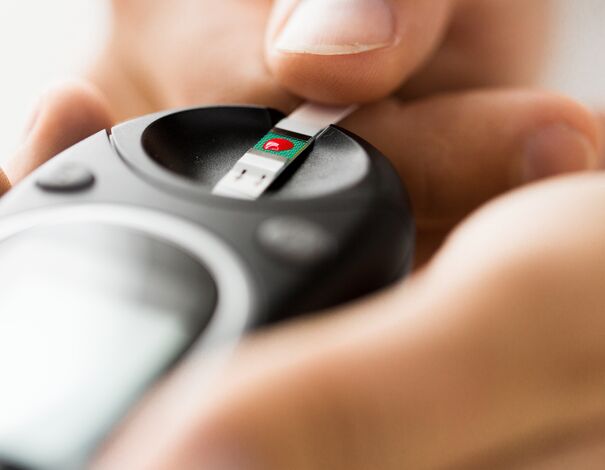Why test your blood glucose?
Carefully monitoring the level of sugar is your blood – known as glucose or glycemia – is an essential part of proper diabetes management. People with diabetes must regularly do this testing using a blood glucose meter (also called a glycometer).What is a blood glucose test?
Blood glucose testing is easy to do: you simply collect a drop of blood from your fingertip and place it on a reactive test strip. The result comes up in seconds and can be read on the screen of the device. Some people must carry out the test several times a day, while others only need to do it a few times a week.
The purpose of the testing is to make sure your blood glucose remains within the target range. You want to avoid hyperglycemia (when glucose level is too high) and hypoglycemia (when glucose level is too low). Ask your healthcare professional ensuring your diabetes follow-up to tell you the exact blood glucose targets you need to reach.
Keeping a close eye on your glycemia can:
- Tell you what your blood glucose level is right away.
- Show you how your activities, meals and medications are affecting your blood glucose levels.
- Help you to understand what lifestyle factors affect your blood glucose.
- Help you and your diabetes healthcare team make changes to your lifestyle and medications to better manage your blood glucose level.

When to test your blood glucose
The frequency of testing varies from one person to another depending on these factors:
- Age State of health
- Type of diabetes (type 1, type 2 or gestational)
- Level of glycemic control
- Use of other medications
- Use of insulin
Your healthcare provider will need to tell you exactly how often you need to do the testing. You must then make a commitment to test as instructed. If you have any problems in this regard, just ask your family pharmacist or a member of the pharmacy team for help.
In general, blood glucose testing is done in the morning upon waking (fasting glycemia), before a meal or 2 hours after a meal (postprandial glycemia). People who need insulin injections several times a day must, for the most part, do 4 to 7 tests daily. For people who only need to test once a day or a few times a week, it is best to do so at different times of the day.
Even if you are not on diabetes medication, testing your blood glucose will give you valuable information to help you better manage your condition.
You may want to test more frequently in the following instances:
- To evaluate the impact of certain foods on your blood glucose
- When you’re dieting or losing weight
- After an intense workout
- During stressful periods
- When you are sick (e.g. cold or stomach flu)
- After quitting smoking
- After making any change to your diabetes medication regimen
Keep a log of your results to show your doctor or diabetes educator.
Blood Glucose Services at your pharmacy
Your pharmacists can support you in monitoring your blood glucose. They can also help you select the glucometer that will be best for you and teach you how to use it. Feel free to consult them!
If you have diabetes, it is extremely important to properly control your blood glucose. If you are having difficulty reaching the targets set by your healthcare professional or if you experience bouts of hyperglycemia or hypoglycemia, speak with your family pharmacists. They can give you advice and recommend changes to your drug therapy, if need be.
Many pharmacies offer a blood glucose monitoring service and private consultations on diabetes management. Ask about these services.
The pharmacy services presented in this section are offered by pharmacist owners who are affiliated with Uniprix. The pharmacists are solely responsible for the professional activities carried out during the practice of pharmacy. These services are offered in participating pharmacies only. Certain fees and conditions may apply.
* The information contained herein is provided for informational purposes only and is not intended to provide complete information on the subject matter or to replace the advice of a health professional. This information does not constitute medical consultation, diagnosis or opinion and should not be interpreted as such. Please consult your health care provider if you have any questions about your health, medications or treatment.




